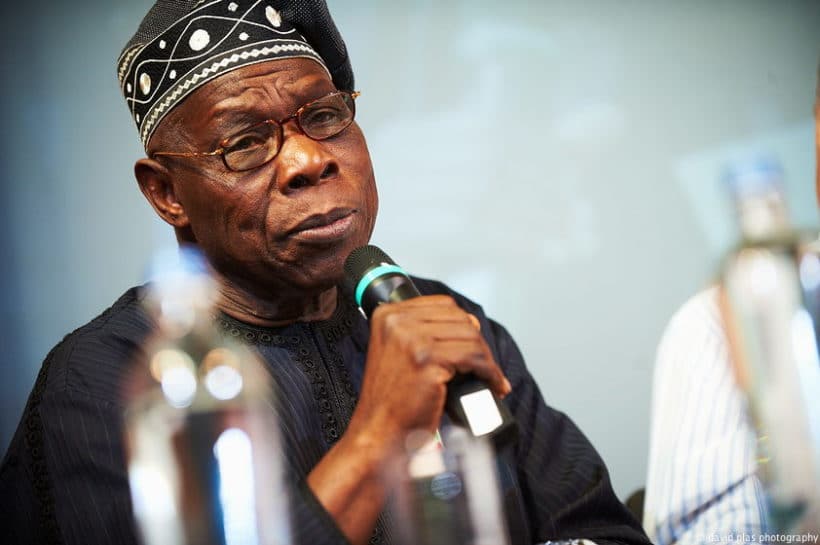
I am the son of a proud, hard-working smallholder farmer. Some of my fondest childhood memories involve following papa to the fields where we grew cassava, maize, plantain, oil palm and other crops and helping him out around the farm. My father was considered the most successful farmer in our Yoruba village near Abeokuta in southwest Nigeria.
Unfortunately, a combination of population growth, land scarcity, soil degradation and political turmoil put paid to his farming business. I have seen many other farmers whose livelihoods fell victim to these same forces.
Like many youths in Africa, I moved to the city for greener pastures. When I was elected Nigeria’s president, the plight – and the importance – of our smallholder farmers was always close to my heart. Now that I have returned to my agricultural roots, the need for a new approach to help them deal with increasingly complex challenges has become even more apparent to me.
Smallholder farmers’ ability to grow nutritious food is threatened by a host of factors that are not of their own making, from economic downturns to armed conflicts. They are also poorly equipped to confront the extreme weather patterns that are already hitting agriculture hard, even though they have contributed the least to the climate crisis. Small-scale farmers, their families and communities are being pushed deeper into poverty, hunger and malnutrition.
Make no mistake – their struggle is our struggle. These farmers, who work on land no larger than two hectares, play a crucial role in ensuring food and nutrition security. Most of the world’s smallholder farmers are in Africa and Asia and they produce up to 80 percent of the food that is consumed locally.
Any disruption in their ability to deliver on the goals of food and nutrition security will directly and increasingly affect us, whereas helping them to become more productive and resilient will help build equitable, sustainable and nutritious food systems, that provide for everyone in Africa and Asia, and the whole world.
Despite their key contribution, these farmers lack access to crucial tools that would support sustainable production. They are also often overlooked in global and national policy discussions, which tend to be dominated by the interests of industrialised farming systems.
Faced with poor public sector support or resources, smallholder farmers have been forced to encroach into reserved land to grow their crops and graze their animals, leading, in some cases, to deforestation and environmental degradation.
With nearly 430 million Africans living in extreme poverty, one in five having gone to bed hungry in 2020, it is time to build a new consensus with and for smallholder farmers to help them adapt to climate change and manage shocks like the COVID-19 pandemic. Let’s invest in their resilience and capacity, and support them to scale up sustainable agricultural practices and enhance their productivity and incomes by 2030 as set out in Sustainable Development Goal target 2.3.
Here are my five suggestions to world leaders, but particularly those in Africa, on how we can achieve this.
First, we must invest in and develop policies that are favorable to smallholder farmers, build resilience, promote sustainable production, and uphold the Comprehensive Africa Agriculture Development Programme (CAADP) Commitments: allocating 10% of national budgets to agriculture, improving access to finance, markets, extension services and usable technologies, especially for women and youth, modernising land tenure systems, and supporting other policies that allow small- and medium-sized enterprises to grow and thrive.
We should engage all stakeholders, especially smallholder farmers, to develop a long-term vision for food systems aligned with National Development Plans (NDPs) and budgets. Good leaders learn from their predecessors, continue building on good policies and use lessons to improve national policies and programs.
We should coordinate public and private actors within and across sectors to better align interventions and resource allocation to reach smallholder farmers.
Fourth, we must implement stronger accountability mechanisms linked to national and sub-national data systems, to enhance the design, monitoring, tracking and progress reporting of public and private sector actions.
Lastly, we must pledge to ‘leave no one behind’. Supporting marginalised and vulnerable groups will go a long way towards combating poverty, hunger and climate change. Women make up 45-60% of the agricultural labour force in parts of Africa and Asia. According to the World Bank, helping them access assets and inputs could increase yields on women-run farms by 20-30 percent. Youths under the age of 25 are nearly 40% of Africa’s working age population but more than 60% are unemployed. Agriculture is the economic sector that can employ millions of young people and enhance food security. Indigenous peoples have a long, rich history of sustainable, resilient, productive, and nature-positive food and farming systems. We can and should learn from them and help them protect their practices from the impacts of climate change.
There is an urgent need to make sure that smallholder farmers have a voice in the policy choices that governments will be making in the coming weeks, months and years.
There is no better time to develop a new consensus with them, because our very existence in this world depends on their ability to withstand the multiple pressures and shocks they now face.
H.E. Chief Olusegun Obasanjo was President of the Federal Republic of Nigeria from 1999 to 2007 and now the CEO and founder of Obasanjo Farms Nigeria Limited. He is the Chair of the Africa Food Prize among many global positions he is holding.

